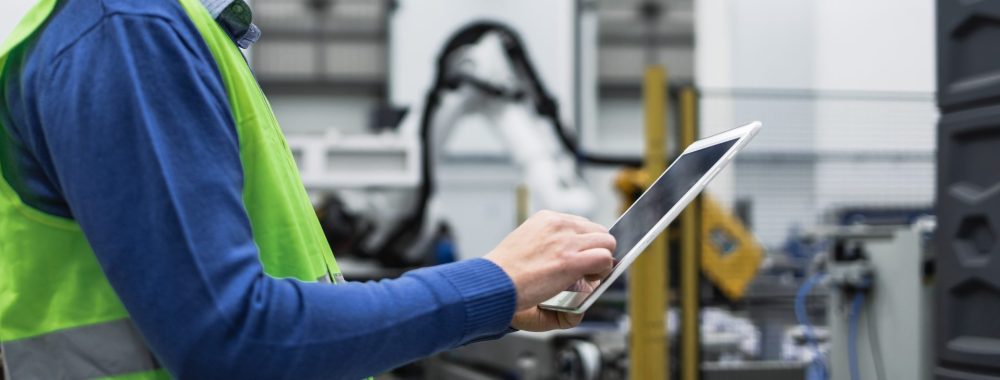Today, it is essential for the industrial sector to be able to create new sources of revenue and expand new services by using IoT to monitor industrial assets. Knowing the operation and status of each industrial asset leads not only to improve the production process in the plant, but also provides a strategic advantage over the competition.
Industrial asset monitoring and IoT: A collaboration
Monitoring industrial assets with connected sensors, and managing processes from an operational platform, allows you to monitor asset status in the field to provide maintenance solutions and/or collect data points for future product improvements. Monitoring allows data to be managed intelligently through IoT applications, offering a proactive approach to maintenance and monitoring of industrial equipment.
The main industrial objective is to minimize costs and maximize profits without compromising service or product quality. This is only possible, with the help of digital tools that provide instantly reliable data of what is happening on each machine and in each part of the process.
Therefore, only through direct monitoring of assets can a company’s industrial process be maximized.
Applications of IoT machine monitoring solutions
Industrial asset monitoring has become efficient and simple due to the use of smart equipment in manufacturing production plants. Smart machines have managed to take industrial progress to the next level in a very short time. Now, it is easier to process assets in real time and identify bottlenecks before manual labor is involved.
The Internet of Things comprises multiple interconnected devices or assets. In large industries, IoT works through web-enabled sensors that are installed on these devices or machines to collect valuable information. This data is shared with a central platform for real-time processing and analysis.
This data collection and analysis of the data, helps in making important decisions that result in increased machine efficiency on the plant floor.
The use of a machine monitoring solution in industry has numerous advantages. Some of them are listed below.
Machine availability
To achieve maximum equipment performance, it is important to monitor when machines are running, their downtime or the cause of downtime. Machine monitoring helps to automate most of the tasks, such as downtime detection or noise identification, making it possible to foresee failures and adopt solutions before these problems occur with preventive rather than reactive maintenance.
Production traffic
This part helps to know exactly where the product is in the production process in the factory, either on the conveyor belts or on the assembly or packaging lines. Tracking every movement of inputs and outputs that are part of the chain is vital to quickly and efficiently manage both production and shipments.
Asset status
It is essential to be able to identify the condition of the plant’s industrial equipment and assets, determine their health and performance by monitoring various parameters such as temperature, pressure, noise, vibration, proper maintenance, and their condition and quality.
Resource Usage
Track the consumption of resources such as fuel, electricity, lubricants or coolants. Tracking resources manually is obsolete, not only because of the large amount of time wasted, but also because it is unfeasible to calculate consumption manually in real time. Digital control can increase the efficiency of resource use and reduce excessive waste.
Detailed processes
Machines running on computer numerical control systems are programmed by code to achieve precise machine operations, and intelligent manufacturing systems provide effective program optimization by studying tool paths, tool life cycles and feed rates to improve machine accuracy.
Improved communication in the industry
Previously, it was difficult to maintain the communication network within the industry at the operator-to-manager and operator-to-operator levels. This has been rectified with the advanced methods of the Internet of Things. It is now easier to channel the tasks of each employee and half of the laborious work has been replaced by effective computerization. Machine monitoring helps to automate most of the tasks, such as stop detection, noise identification, etc. It acts as a rescue door for plant operators to work efficiently and with accurate results.
Nexus Integra for the supervision of industrial equipment with IoT
Having an operational platform will allow you to manage, monitor and supervise your industrial assets from a single place, controlling every detail of the production process.
Proactive maintenance solutions
Nexus Integra is a powerful operational platform that monitors machine data in real time to integrate, process and analyze it, transforming it into useful, valuable and visual information. Operators can resolve errors and faults in specific components of a machine or any part of the industrial process with on-the-spot diagnostics.
Remote monitoring in the cloud helps reduce spending on maintenance services and overall operating costs, prolonging the life of machines and other industrial assets.
Real-time data from your machines
Our platform allows you to leverage real-time information on new or existing machinery. Gain a competitive advantage by monitoring conditions and tracking production from anywhere. Users can visualize data in the Smart SCADA tool, dashboards, reports and the Machine Learning App, which allows you to leverage algorithms with the help of artificial intelligence to get the most out of your machinery.
Product development and innovation
Make smart decisions on the fly and stay ahead of the decisions of the future. Every year, product managers in various industries fund research studies to learn how products work in different environments, how customers prefer to use products and how to improve them. Nexus Integra can help you collect, organize, analyze and use product data to your advantage.
Contact our team of experts to study your company’s needs and provide you with a customized solution that fits your company’s characteristics.


